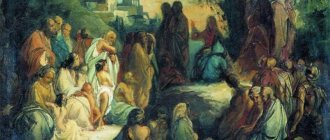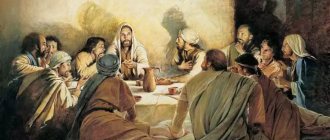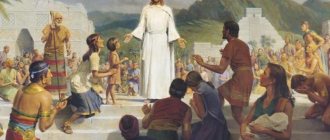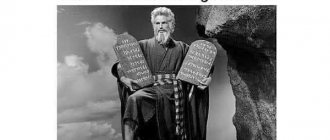A covenant is an agreement between two or more parties
And fulfill the terms they agreed to. If we talk about the blood covenant, then it can only be dissolved by death. The blood covenant is the strongest covenant known to man.
When an agreement is made - a covenant with God, He will never break His part.
There is a covenant of grace—a covenant of unmerited favor.
There have been different covenants throughout history. For example, the covenant of Adam. This is the covenant that God made with Adam. There was also a covenant with Noah. There was a covenant with Abraham. These are just a few of the covenants.
There are two main covenants that we should know about and that concern us today:
- Old Testament of Moses.
- New Testament of Jesus Christ.
If you have an understanding of the difference, then you will have unshakable faith and confidence in God's unmerited favor.
List of covenants (agreements) of God with people
| Covenant | Dilapidated | Dilapidated | Dilapidated | Dilapidated | Dilapidated | New |
| With whom does God make a covenant? | Adam Gen.1:28, Gen.2:16–17 | Noah Gen.9:1–17, all people and beasts Gen.9:8–10 | Abraham Gen. 17 | Moses Exod.6 | David 2 Samuel 7:1–17 | All people Luke 22:20 |
| Time to make a covenant | OK. 3700 BC | OK. 2400 BC | About 1900 BC. | About 1250 BC. | OK. 1000 BC | 1st century R.H. |
| Commandments | “Be fruitful and multiply, and fill the earth and subdue it,” do not eat from the tree of the knowledge of good and evil. Gen.2:16–17, Gen.1:28 | “Be fruitful and multiply,” “do not kill.” Gen.9:1, 5–6 | “walk with God,” believe Gen. 17:1 | Ten Commandments Exodus 20:1–17 | Ten Commandments Deuteronomy 5:6–21 | About love John 13:34 |
| Divine Promise | Blessing for possession of the earth and dominion over all animals. Gen.1:28 | There will be no flood. Gen.9:11 | The descendants of Abraham will be believers, numerous, and will take possession of Palestine Gen. 17:5–8 | Rescue from Egypt and settlement in Palestine Ex.6:6–8 | Messiah from the House of David 2 Samuel 7:16 | Eternal life John 12:50, John 2:25 |
| Sign of the covenant | — | Rainbow. Gen.9:12–13 | Circumcision Gen. 17:11 | Saturday Exodus 31:13 | Saturday and Temple | Cross, Eucharist Luke 22:14–20; 1 Corinthians 11:26 |
All Holy Scripture is a supernatural, indivisible Revelation of God, constituting the “single body of truth” (St. Ephraim the Syrian) or the single Covenant of God with humanity.
At the same time, it must be understood that, despite the unity and inspiration of the entire Bible, God was pleased to reveal Himself in accordance with the spiritual and intellectual abilities and gifts of mankind. Remaining unchanged, God, in proportion to the level of their understanding, gradually and continuously revealed the doctrine of the Messiah. This is what needs to be shown in lectures. Thus, the single Covenant of God with people breaks down into several stages.
First of all, it is divided into two Covenants - the “Primitive Covenant” or “works” and the “Covenant of Grace” or “restored”. They are separated by the fall of Adam.
The beginning of the Covenant of Works on the part of God was the Eternal Council, at which the plan for the creation of the world, the redemption and salvation of mankind was predetermined. The end of this Covenant was the promise of the Redeeming Seed of the woman (Gen. 3:15). For man, the primitive Testament begins with the creation of Adam and ends with the fall of people. The covenant of works is a covenant between God and Adam, in which Adam was promised life for perfect obedience and death for disobedience.
The Restored Covenant begins with the first promise of a Redeemer in Paradise and ends with the end of the world. The covenant of grace is a covenant between God and the sinner, whereby God promises salvation by grace and the sinner promises a life of faith and obedience. All Old Testament believers, as well as modern believers, are included in the covenant of grace.
This Testament, in turn, is divided into two parts: the Old Testament, in which people were saved by faith in the Redeemer to come, and the New Testament, saving by faith in the Redeemer who came.
The Old Testament, having its beginning in the First Gospel (Gen. 3:15), splits into two: into the Covenant concluded by God with all humanity through Adam and Noah, and into the Covenant with the chosen Jewish people - through Abraham, Isaac and Jacob. The first of these two covenants applies to all the descendants of Adam before Noah (as can be seen from 1 Pet. 3:18-20, 4:4-7), and after Noah is intended for all humanity who did not know about the other Testaments.
The covenant made with the Jewish people through Abraham was broken in Egypt, but then restored, expanded and clarified through Moses. It can be spoken of as two: the Patriarchal Covenant - before Moses, and the Legislative Covenant - from Moses to Christ.
This sub-legal covenant was confirmed and renewed twice. The first time this happened was under King David, to whom the Lord promised to raise Christ from his family. Secondly - under Ezra, after the ten tribes of Israel completely fell away from the true faith; and the Covenant made with the house of David was weakened by the wickedness of the last kings of Judah. During the period of the last covenant concluded under Ezra, the reign of the Davidic dynasty finally ended, and an Edomite, Herod, reigned in Jerusalem and Judea. Finally, the Redeemer came into the world, for whom humanity had been eagerly awaiting and who concluded the New Testament.
Testaments in the Bible
Old Testament of Moses
Dilapidated because it is dilapidated, outdated and close to destruction. The Law was given to Moses on Mount Sinai. It is also known as the covenant of law because it was based on the fulfillment of the law.
The new covenant of Jesus under which we live today.
Its basis is the undeserved and unearned favor of God. The Bible is very clear about this. We are no longer under the covenant of law, but under the covenant of grace.
(Rom 6:14
) Sin must not have dominion over you, for you are not under the law, but under grace.
(1 John 1:17
) For the law was given through Moses, but grace and truth came through Jesus Christ.
Grace and truth are synonymous. There can be no grace without truth and truth without grace.
(1 John 1:14
) And the Word became flesh and dwelt among us, full of grace and truth; and we saw His glory, glory as of the only begotten of the Father.
What is a covenant
The word “covenant” comes from the Old Slavonic “vet” and means “advice, persuasion, consent, agreement, order, instruction.”
Origin of the word
This word was first discovered in ancient Russian written monuments of the 11th century. Scientists suggest that this word was formed on a common Indo-European basis. The ancient Indian "vakya" means "word, speech." Derivative - treasured.
For the first time, the word “covenant” was heard from the lips of the prophet Moses, who brought the 10 commandments inscribed on tablets to the people of Israel. With these commandments, God entered into an agreement with the Jewish people, according to which every Israeli who complies with the commandments receives mercy and help from God.
Definition of the concept
Meaning of the word "covenant":
- law, order to descendants, followers;
- a custom inherited from past generations;
- God's contract with humanity;
- commandments given by Jesus Christ;
- a prescription of a social and moral nature.
The Abrahamic Covenant in Action
Before the law was given to Moses, none of the children of Israel died coming out of Egypt. Although they complained and grumbled.
But why didn’t any of them die before the law?
(Psalm 104:37
) And he brought out the Israelites with silver and gold, and there was no sick man among their tribes.
No one died despite the fact that they grumbled, complained and behaved unreasonably.
(Exod14:11
) And they said to Moses: Are there no graves in Egypt, because you have brought us to die in the desert? What did you do to us when you brought us out of Egypt?
And instead of sending fire from heaven, God sent them manna to feed them.
(Exodus 15:23-25)
They came to Marah and could not drink the water in Marah, for it was bitter, which is why the name of that place was given: Marah. And the people murmured against Moses, saying, What shall we drink? Moses cried out to the Lord, and the Lord showed him a tree, and he threw it into the water, and the water became sweet. There God gave the people a charter and a law and tested them there.
(Exodus 16:3)
And the children of Israel said to them: Oh, that we might die by the hand of the Lord in the land of Egypt, when we sat by the meat pots, when we ate our fill of bread! For you brought us out into this desert to starve this entire congregation.
They grumble in the desert and what does God do? It divides the waters of the Red Sea. They complain that they have nothing to eat, and God, instead of fire, gave bread from heaven. Look at the merciful God. Although the Jews did not deserve mercy. What did they do to make the waters of the Red Sea part? They walked through the sea, grumbling all the time. But they were covered by the mercy of God.
All of these events occurred before the Ten Commandments were given. Before the law was given, the children of Israel were under grace, under unmerited favor. And all provision depended on God's goodness, not on their obedience. They were not obedient. Manna was given to them because God is good. The waters of the Red Sea parted because God is good.
Abraham's Justification by Faith
The basis of this covenant was grace and unmerited favor.
Remember that Abraham lived 430 years before the law was given.
A comment!
The relationship between God and Abraham was built on the grace of God.
It was as if Abraham was saying, “God, I don’t know how You will do it, when You will do it, but I believe that it will happen on the basis of my faith and undeserved favor towards me.”
(Rome 4:2
) If Abraham was justified by works, he has praise, but not before God. For what does the scripture say? “Abraham believed God, and it was counted to him as righteousness.”
Today we live under the covenant of grace and God's blessings. God's provision is based entirely on goodness and His faithfulness. But many people today live according to the Law of Moses. Even today, at everything good that happens to us, we look back and try to figure out: what did we do to make this happen?
The source of goodness is the goodness of God and His favor towards us.
Every time you want to take credit for your good behavior, the fact that you didn’t quarrel with your husband today, treated people well, remember that this is not what attracts the goodness of God to you. The source of God's goodness to you is God's goodness.
All the way from Egypt to Mount Sinai, the Israelites were under the Abrahamic covenant of grace. Therefore, despite their sins, God brought them out of Egypt and provided for them supernaturally. And the basis of this provision was not their good deeds, not their faithfulness, but the goodness and faithfulness of the Lord.
Cultural and literary heritage
It so happened that covenant is a word that has a notational and educational character. He who has eyes, let him see; he who has ears, let him hear the word of God or the word of a respected and significant person. Therefore, covenants that are consonant with advice do not just share experience, but also bequeath values.
The worldly interpretation of the word “covenant” is revealed in a detailed analysis and cases of use by V.I. Dahl’s dictionary. The variety of cognate words comes down to the fact that a covenant is a certain word or opinion of an authoritative person, giving the one who heard it advice about the possibility of choosing his own path.
What is a profession
“Testament” is a poem by Taras Shevchenko from 1845.
“Testament” is a 2007 feature film by E. Kusturica about the order, testament, of a dying grandfather to his grandson, which led to the creation of a new happy family.
“Zavety” is a literary and political magazine of the early 20th century in Russia (1912-1914).
In the history of culture there are references to cherished holidays. On this day, residents of a certain locality or area held celebrations in honor of a saint who helped them in difficult times. A natural disaster or emergency (drought, epidemic, fire, etc.) united residents and was often accompanied by an appeal to the saints asking for help and protection. As a sign of getting rid of the problem, residents considered it their duty to thank the saint for his attention and help.
We also recommend reading: Genocide in Rwanda
Testaments in the Bible
Substitution of the Abrahamic Covenant for the Law
God is faithful to us even when we are not faithful. This is the essence of grace.
But the Israelites exchanged one covenant - Abraham's, for another - the covenant of the law. And that's when everything changed.
(Exodus 19:4-6
) You have seen what I did to the Egyptians, and how I carried you as if on eagle’s wings, and brought you to Myself; Therefore, if you will obey My voice and keep My covenant, (this still applies to us today) then you will be My inheritance from all nations, for all the earth is Mine, and you will be to Me a kingdom of priests and a holy nation; These are the words that you will speak to the children of Israel.
(Exodus 19:7-8)
And Moses came and called the elders of the people and set before them all these words which the Lord had commanded him.











